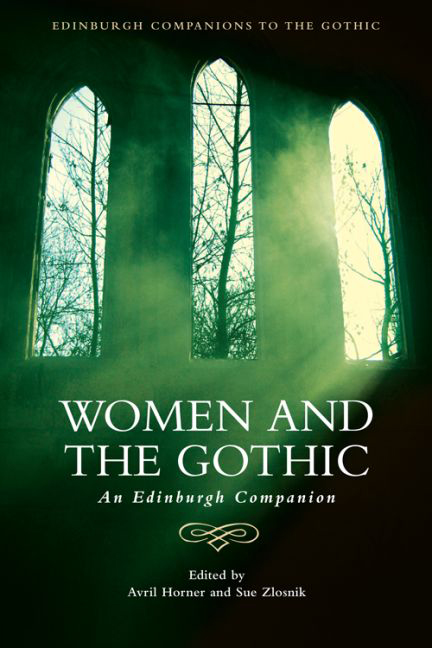Book contents
- Frontmatter
- Contents
- Acknowledgements
- Introduction
- Part I Family Matters
- 1 Heroines in Flight: Narrating Invisibility and Maturity in Women's Gothic Writing of the Romantic Period
- 2 Madwomen and Attics
- 3 Mothers and Others
- 4 The Gothic Girl Child
- 5 ‘A Woman's Place’
- Part II Trangressions
- Part III New Directions
- Notes on Contributors
- Index
5 - ‘A Woman's Place’
from Part I - Family Matters
Published online by Cambridge University Press: 23 September 2017
- Frontmatter
- Contents
- Acknowledgements
- Introduction
- Part I Family Matters
- 1 Heroines in Flight: Narrating Invisibility and Maturity in Women's Gothic Writing of the Romantic Period
- 2 Madwomen and Attics
- 3 Mothers and Others
- 4 The Gothic Girl Child
- 5 ‘A Woman's Place’
- Part II Trangressions
- Part III New Directions
- Notes on Contributors
- Index
Summary
In Norah Lofts's story ‘A Curious Experience’ (first published in Woman's Journal in 1971) a young writer goes to live in a rented house in suburban Suffolk while her husband is away in New York. She is not, as she tells her husband when he proposes, ‘the domestic type’ but the newly married couple have been ‘happy as larks’ (Lofts 1974: 110). The house is rented fully furnished at a rent so ‘astonishingly low’ as to arouse the narrator's ‘darkest suspicions’ (111) because the arthritic owner is confined to a ‘Home’. The ‘rot set[s] in’ (113), however, when the narrator, anxious to finish her second novel, is overtaken by a curious compulsion to clean the house. The ‘good spirit’ had ‘gone from me’ (113), she writes, that ‘Deadly’ loss, ‘The thing we [writers] all fear’ (113). Over the next weeks she does so much cleaning – shining windows, tackling the ‘offensive’ (115) cupboard under the sink, and taking loads of linen to the launderette – that she damages her wrist. Finally, she makes a surprising diagnosis:
I never studied psychology, but I had read enough to know what was wrong with me. Fundamentally, I thought, I did not like, or was not satisfied with the story on which I should be working. […] And I was taking refuge from my predicament by pretending to be busy with other things. (Lofts 1974: 116)
Her novel, she recognises, should be written in the first person and not third. But just as she starts to type again, the owner's niece, Mrs Willis, arrives to announce that she must move out because the owner has finally found a housekeeper, which will enable her to return ‘home’. Struck by a thought, the narrator asks, ‘Would you call your aunt a dominant personality? […] And was, I mean is she house-proud?’ (118). Answered in the affirmative she realises, ‘I knew what had got into me, I'd been for a month possessed’ (118; my emphasis). On one level a comic allegory about writerly procrastination, this story also deftly exploits the language of the Gothic – ‘darkest suspicions’, ‘rot’, ‘spirit’, ‘haunting’, ‘deadly’, ‘fear’ – to explore how women can become ‘possessed’ by the domestic. As Anne Sexton puts it in ‘Housewife’ (1962), ‘Some women marry houses’ (Sexton 1991: 64) and Lofts's narrator struggles to resist precisely this kind of entrapment.
- Type
- Chapter
- Information
- Women and the GothicAn Edinburgh Companion, pp. 74 - 88Publisher: Edinburgh University PressPrint publication year: 2016



